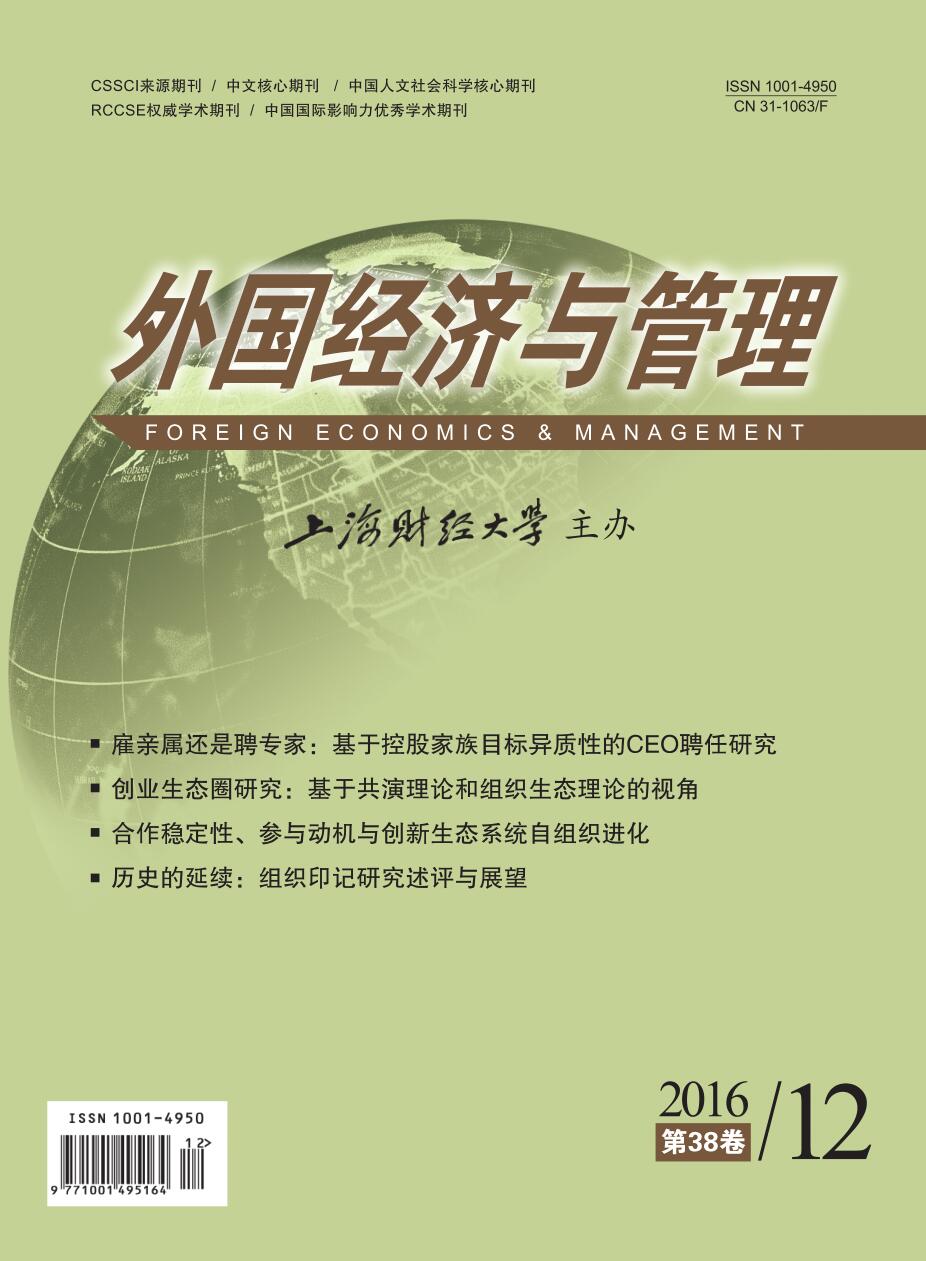早期研究认为,人们追求公平的动机在于自利或者对人际关系的需求,进而提出了工具模型和人际关系模型。然而最新研究指出人们珍视公平源于道德义务,而追求公平的目的就是公平自身,这种动机被称为道义公平。道义公平的提出丰富了半个世纪以来人们对公平动机的认知,为解释人们追求公平的行为提供了更加合理的视角,对公平理论的发展与完善具有重要意义。本文回顾了道义公平的理论发展、构成维度与测量方法、影响因素与影响效应,结合道义公平的研究趋势与当前研究存在的局限性展望了该领域未来的研究方向。
道义公平研究述评与展望
摘要
参考文献
6 Aguilera R V, Rupp D E, Williams C A, et al. Putting the S back in corporate social responsibility:A multilevel theory of social change in organizations[J]. Academy of Management Review, 2007, 32(3):836-863. DOI:10.5465/AMR.2007.25275678
7 Beugré C D. Development and validation of a deontic justice scale[J]. Journal of Applied Social Psychology, 2012, 42(9):2163-2190. DOI:10.1111/jasp.2012.42.issue-9
9 Colquitt J A, Scott B A, Judge T A, et al. Justice and personality:Using integrative theories to derive moderators of justice effects[J]. Organizational Behavior and Human Decision Processes, 2006, 100(1):110-127. DOI:10.1016/j.obhdp.2005.09.001
10 Crawshaw J R, Cropanzano R, Bell C M, et al. Organizational justice:New insights from behavioural ethics[J]. Human Relations, 2013, 66(7):885-904. DOI:10.1177/0018726713485609
11 Cropanzano R, Goldman B, Folger R. Deontic justice:The role of moral principles in workplace fairness[J]. Journal of Organizational Behavior, 2003, 24(8):1019-1024. DOI:10.1002/(ISSN)1099-1379
12 Cropanzano R, Greenberg J. Progress in organizational justice:Tunneling through the maze[J]. International Review of Industrial and Organizational Psychology, 1997, 12:317-372. DOI:10.1023/A:1007726012218
14 Cropanzano R, Stein J H. Organizational justice and behavioral ethics:Promises and prospects[J]. Business Ethics Quarterly, 2009, 19(2):193-233. DOI:10.5840/beq200919211
15 Degoey P. Contagious justice:Exploring the social construction of justice in organizations[J]. Research in Organizational Behavior, 2000, 22:51-102. DOI:10.1016/S0191-3085(00)22003-0
16 Erdogan B, Bauer T N, Taylor S. Management commitment to the ecological environment and employees:Implications for employee attitudes and citizenship behaviors[J]. Human Relations, 2015, 68(11):1669-1691. DOI:10.1177/0018726714565723
17 Folger R, Ganegoda D B, Rice D B, et al. Bounded autonomy and behavioral ethics:Deonance and reactance as competing motives[J]. Human Relations, 2013, 66(7):905-924. DOI:10.1177/0018726713482013
18 Folger R, Konovsky M A. Effects of procedural and distributive justice on reactions to pay raise decisions[J]. Academy of Management journal, 1989, 32(1):115-130. DOI:10.2307/256422
19 Greenberg J. Looking fair vs. being fair:Managing impressions of organizational justice[J]. Research in Organizational Behavior, 1990, 12(1):111-157.
20 Greenberg J. Setting the justice agenda:Seven unanswered questions about "what, why, and how"[J]. Journal of Vocational Behavior, 2001, 58(2):210-219. DOI:10.1006/jvbe.2001.1792
21 Hillebrandt A, Barclay L J. Integrating organizational justice and affect:New insights, challenges, and opportunities[J]. Social Justice Research, 2013, 26(4):513-531. DOI:10.1007/s11211-013-0193-z
22 Kiehl K A. A cognitive neuroscience perspective on psychopathy:Evidence for paralimbic system dysfunction[J]. Psychiatry Research, 2006, 142(2-3):107-128. DOI:10.1016/j.psychres.2005.09.013
23 Knyazev G G, Slobodskaya H R. Personality trait of behavioral inhibition is associated with oscillatory systems reciprocal relationships[J]. International Journal of Psychophysiology, 2003, 48(3):247-261. DOI:10.1016/S0167-8760(03)00072-2
24 Massaro S, Becker W J. Organizational justice through the window of Neuroscience[A]. Waldman D A, Balthazard P A. Organizational Neuroscience (Monographs in Leadership and Management, Volume 7)[M]. Bradford:Emerald Group Publishing Limited, 2015:257-276.
26 Reb J, Goldman B M, Kray L J, et al. Different wrongs, different remedies? Reactions to organizational remedies after procedural and interactional injustice[J]. Personnel Psychology, 2006, 59(1):31-64. DOI:10.1111/peps.2006.59.issue-1
27 Rupp D E. Testing the moral violation component of fairness theory:Moral maturity as a moderator of the deontological effect[A]. The Annual Meeting of the Society for Industrial and Organizational Psychology[C]. Orlando, 2003.
28 Rupp D E, Bell C M. Extending the deontic model of justice:Moral self-regulation in third-party responses to injustice[J]. Business Ethics Quarterly, 2010, 20(1):89-106. DOI:10.5840/beq20102017
29 Rupp D E, Ganapathi J, Aguilera R V, et al. Employee reactions to corporate social responsibility:An organizational justice framework[J]. Journal of Organizational Behavior, 2006, 27(4):537-543. DOI:10.1002/(ISSN)1099-1379
30 Rupp D E, Shao R D, Thornton M A, et al. Applicants' and employees' reactions to corporate social responsibility:The moderating effects of first-party justice perceptions and moral identity[J]. Personnel Psychology, 2013, 66(4):895-933. DOI:10.1111/peps.2013.66.issue-4
31 Skarlicki D P, Kulik C T. Third-party reactions to employee (mis) treatment:A justice perspective[J]. Research in organizational behavior, 2004, 26:183-229. DOI:10.1016/S0191-3085(04)26005-1
32 Skarlicki D P, Rupp D E. Dual processing and organizational justice:the role of rational versus experiential processing in third-party reactions to workplace mistreatment[J]. Journal of Applied Psychology, 2010, 95(5):944-952. DOI:10.1037/a0020468
33 Treviñ o L K, Weaver G R. Organizational justice and ethics program "follow-through":influences on employees' helpful and harmful behavior[J]. Business Ethics Quarterly, 2001, 11(4):651-671. DOI:10.2307/3857765
34 Turillo C J, Folger R, Lavelle J J, et al. Is virtue its own reward? Self-sacrificial decisions for the sake of fairness[J]. Organizational Behavior and Human Decision Processes, 2002, 89(1):839-865. DOI:10.1016/S0749-5978(02)00032-8
35 Tyler T R, Degoey P. Collective restraint in social dilemmas:Procedural justice and social identification effects on support for authorities[J]. Journal of Personality and Social Psychology, 1995, 69(3):482-497. DOI:10.1037/0022-3514.69.3.482
36 Tyler T, Degoey P, Smith H. Understanding why the justice of group procedures matters:A test of the psychological dynamics of the group-value model[J]. Journal of Personality and Social Psychology, 1996, 70(5):913-930. DOI:10.1037/0022-3514.70.5.913
37 Tyler T R, Lind E A. A relational model of authority in groups[J]. Advances in experimental social psychology, 1992, 25:115-191. DOI:10.1016/S0065-2601(08)60283-X
38 Umphress E E, Simmons A L, Folger R, et al. Observer reactions to interpersonal injustice:The roles of perpetrator intent and victim perception[J]. Journal of Organizational Behavior, 2013, 34(3):327-349. DOI:10.1002/job.v34.3
39 Vecchio R P. An individual-differences interpretation of the conflicting predictions generated by equity and expectancy theory[J]. Journal of Applied Psychology, 1981, 66(4):470-481. DOI:10.1037/0021-9010.66.4.470
40 Zheng X W. Influence of employees' unethical behavior on their victimization from observers:The role of relationship conflict and deontic justice[J]. Metallurgical and Mining Industry, 2015,(3):250-259.
引用本文
任巍, 王一楠. 道义公平研究述评与展望[J]. 外国经济与管理, 2016, 38(12): 103–112.
导出参考文献,格式为:






 8443
8443  8891
8891

